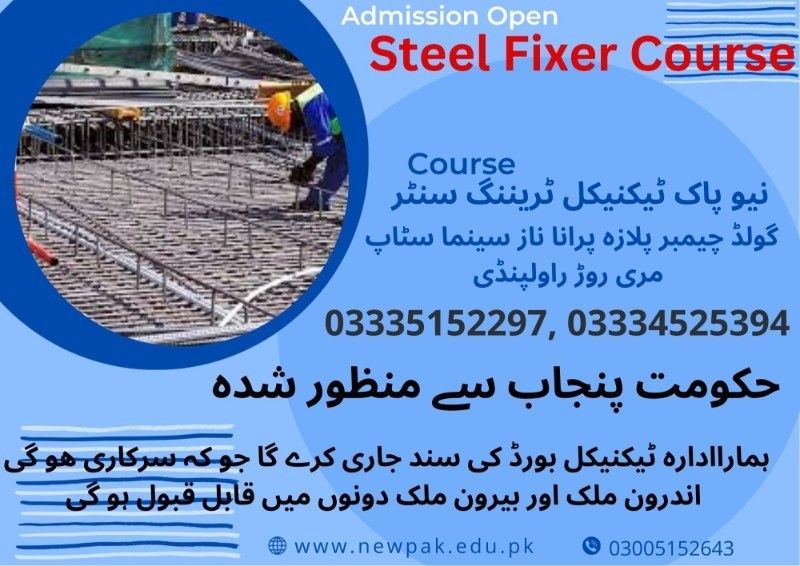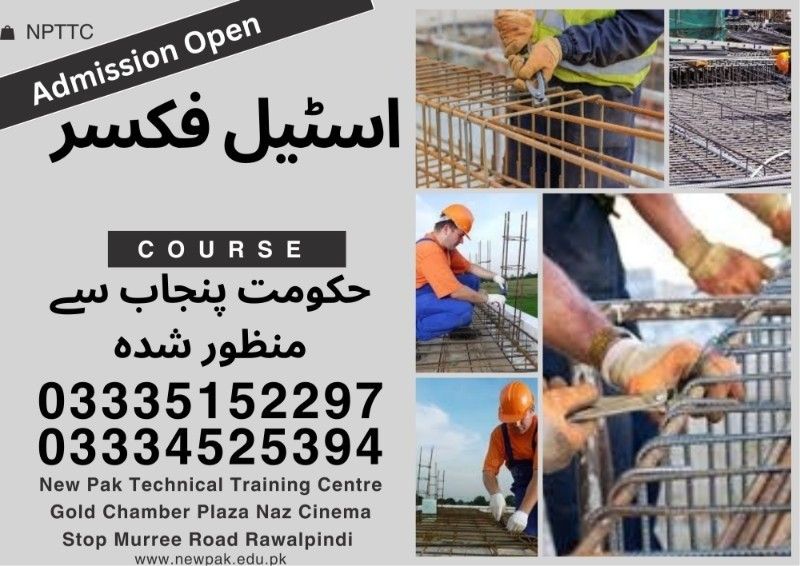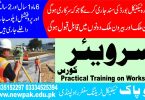
Steel Fixer Course in Rawalpindi Islamabad
The Steel Fixer course equips students with the skills to cut, bend, and fix steel bars and mesh to reinforce concrete structures such as buildings, bridges, and tunnels. It emphasizes safety, efficiency, and the ability to read construction drawings, identify steel types, and accurately position reinforcement. Steel fixing plays a vital role in the construction industry, ensuring the durability and stability of reinforced concrete with the collaboration of architects and engineers. Students must be physically fit, able to work at heights and in all weather conditions, and possess strong attention to detail. Graduates are in high demand by construction companies, engineering firms, and infrastructure organizations.
Course Overview
Our Steel Fixer course in Rawalpindi Islamabad offers practical and theoretical training in steel reinforcement techniques. The 6-month program covers core skills, while the 1-year program includes advanced modules like welding, structural drawing, and quality control to enhance employability and career growth.

Course Duration
06 | Months
-
Introduction to the Construction Industry
-
Role of a Steel Fixer
-
Health and Safety in Construction
-
Construction Drawings and Specifications
-
Construction Materials
-
Types of Steel and Properties
-
Tools and Equipment for Steel Fixing
-
Measurement and Cutting
-
Cutting, Bending, and Fabrication
-
Bending and Shaping
-
Positioning and Fixing Steel Bars
-
Fixing and Tying Rebars
-
Practical Exercises and Demonstration
01 | Year
-
Introduction to the Construction Industry
-
Role of a Steel Fixer
-
Health and Safety in Construction
-
Construction Drawings and Specifications
-
Construction Materials
-
Types of Steel and Properties
-
Tools and Equipment for Steel Fixing
-
Measurement and Cutting
-
Cutting, Bending, and Fabrication
-
Bending and Shaping
-
Positioning and Fixing Steel Bars
-
Fixing and Tying Rebars
-
Practical Exercises and Demonstration
-
Welding and Joining Steel
-
Reading Structural Drawings
-
Concrete Placement and Finishing
-
Quality Control in Steel Fixing
-
Safety Protocols and Emergency Basics
Course Outline (6 Months)
Basics and Safety in Construction
Month 1
- Introduction to the Construction Industry
- Overview of the construction industry and its importance
- Introduction to the role of a steel fixer in construction
- Health and Safety in Construction
- Basic health and safety principles in construction
- Personal protective equipment and safe working practices
- Hazards and risks associated with steel fixing
Construction Plans & Materials
Month 2
- Construction Drawings and Specifications
- Understanding construction drawings and symbols
- Interpretation of construction specifications and standards
- Planning and preparation for steel fixing based on drawings
- Construction Materials
- Types of reinforcing steel bars (rebars) commonly used in Pakistan
- Other materials and tools used in steel fixing (e.g., ties, spacers, supports)
Steel Types and Essential Tools
Month 3
- Types of Steel and Their Properties
- Introduction to different types of steel used in construction
- Understanding the properties of steel, such as strength and durability
- Basic knowledge of steel grades and sizes
- Tools and Equipment for Steel Fixing
- Identification and proper use of steel fixing tools and equipment
- Maintenance and storage of steel fixing tools
Measurement, and Fabrication
Month 4
- Measurement and Cutting
- Techniques for accurately measuring and cutting reinforcing steel bars
- Use of tools such as tape measures, cutting torches, and saws
- Cutting, Bending, and Fabricating Steel
- Techniques for cutting, bending, and fabricating steel bars and mesh
- Understanding the importance of accuracy and precision
- Safety measures for handling steel and cutting tools
Bending and Positioning
Month 5
- Bending and Shaping
- Methods for bending and shaping rebars
- Use of bending machines, manual bending tools, and templates
- Positioning and Fixing Steel Bars and Mesh
- Techniques for positioning and fixing steel bars and mesh in reinforced concrete structures
- Proper placement and alignment of steel bars and mesh
- Techniques for securing and fixing steel bars and mesh
Fixing Techniques & Certification
Month 6
- Fixing and Tying Rebars
- Techniques for properly positioning and securing rebars in concrete forms
- Various tying methods (e.g., wire tying, snap ties)
- Practical Exercises and Demonstration
- Hands-on practice sessions
- Simulated construction site scenarios
- Assessment and Certification
- Evaluation through quizzes, practicals, and a final exam
Course Outline (1-Year)
Months 1–6: Essential Steel Fixer Course in Rawalpindi Islamabad
(Same course content as the 6-month program but with more detail, software technologies, and assessments.)
Welding and Joining Techniques
Month 7
- Welding and Joining Steel
- Techniques for welding and joining steel bars and mesh
- Safety measures for welding and joining steel
Structural Drawing Skills
Month 8
- Reading Structural Drawings
- Interpreting construction drawings and specifications
- Understanding symbols, dimensions, and callouts related to steel fixing
Concrete and Steel Work
Month 9
- Concrete Placement and Finishing
- Understanding the concrete pouring process
- Coordinating with other construction trades
- Ensuring proper alignment and spacing during concrete placement
- Basic concrete finishing techniques
Quality Control and Assurance
Month 10
- Quality Control in Steel Fixing
- Understanding quality control procedures
- Inspection and testing of steel bars and mesh
- Compliance with construction standards
- Quality Control and Inspection
- Inspection procedures and standards
Advanced Safety Protocols
Month 11
- Safety Practices
- Hazard identification and mitigation strategies
- Personal protective equipment (PPE) requirements
- Emergency procedures and first aid basics
Career Preparation and Certification
Month 12
- Career Opportunities
- Overview of job roles in the steel fixing industry
- Certification upon successful completion
- Final assessments and skill evaluation

Career Opportunities
- Steel Fixer
- Reinforcement Installer
- Construction Supervisor
- Construction Estimator
- Construction Project Manager
Conclusion
A Steel Fixer training equips students with essential skills to read construction plans, measure, cut, and fix steel bars and mesh into concrete structures like foundations, walls, and columns, while ensuring safety and compliance with standards. Graduates can pursue roles such as steel fixers, reinforcement installers, supervisors, estimators, and project managers. Steel fixers position and secure reinforcing bars and mesh as per engineering drawings, tie them using wire, and attach spacers and chairs to ensure proper concrete coverage, forming a strong foundation for a career in construction.






